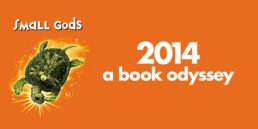Now consider the book and its reader. The book, a non-sentient object, floats around the planet with the help of other creatures. Between floatings, it can be stationary for many turns of the sun. Within it holds the thoughts of a person wishing to transplant those thoughts into the mind of another, for various reasons.
And then there is the reader. Various reasons compel a person to temporarily rescue a book from its aimless existence, open its pages, and consume the thoughts of others. This is one way dangerous ideas are spread. And some have said that this whole arrangement is a bad idea.
Small Gods by Terry Prattchet challenges that idea, for it is a glorious book worthy of worship and idolization. For He tells us a tale that manages to show us the truth and follies of man and how we tend to misunderstand and corrupt everything as if we had some deranged Midas touch.
Prattchet’s masterful parody of religion is never mean-spirited but is often insightfully poignant. He beautifully crafts a witty tale of challenging the status quo, finding and choosing goodness and what is right, in a world that thinks you’re crazy or stupid. When, in fact, it’s the slow and careful thinking which leads to truths more than hot-headed and overly-passionate thought.
In this day and age non-believers are not relieved of their heads or made crispy at a town square BBQ. They are free to try on beliefs, test drive them, praise and ridicule them, and return them with no stocking fee. One may even discover the best belief of all, the belief in ourselves. And understand we are the source of all the good that we do and propagate in this world. For to discover a love of one’s self, to grow in the belief of one’s self, is a path that’ll humble even the smallest of gods.
I’d be amiss to not showcase a few of the brilliant profound absurdities that had me laughing through the whole book. Small Gods on:
Atheists:
‘He says gods like to see an atheist around. Gives them something to aim at.’
Blasphemy:
‘Blasphemy? How can I blaspheme? I’m a god!’
Donkeys:
If you beat a donkey with a stick long enough, the stick becomes all that the donkey believes in.
Evil:
…the worst thing about Vorbis isn’t that he’s evil, but that he makes good people do evil.
Faith:
It didn’t matter if you fooled yourself provided you didn’t let yourself know it, and did it well.
Fear:
Fear is a strange soil. Mainly it grows obedience like corn, which grows in rows and makes weeding easy. But sometimes it grows the potatoes of defiance, which flourishes underground.
Gods:
‘We get the gods we deserve,’ said Brutha, ‘and I think we don’t deserve any.’
Heathens:
The Captain frowned. ‘It’s a funny thing,’ he said, ‘but why is it that the heathens and the barbarians seem to have the best places to go when they die?’ ‘A bit of a poser, that,’ agreed the mate. ‘I s’pose it makes up for ‘em … enjoying themselves all the time when they’re alive, too?’ He looked puzzled. Now that he was dead, the whole thing sounded suspicious.
History:
Things just happen, one after another. They don’t care who knows. But history … ah, history is different. History has to be observed. Otherwise, it’s not history. It’s just … well, things happening one after another.
Learning:
Simony snorted. ‘Well, well,’ he said, ‘we live and learn, just like you said.’
‘Some of us even do it the other way around,’ said Didactylos.
Lying:
Brutha had never been any good at lying. The truth itself had always seemed so incomprehensible that complicating things even further had always been beyond him.
Religion:
And they were engaged in religion. You could tell by the knives (it’s not murder if you do it for a god).
